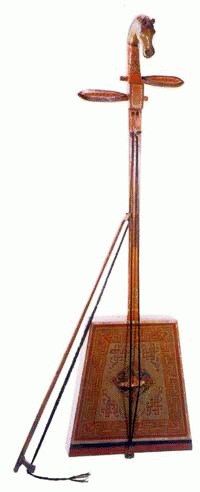 |
||||||||
MaTouQin |
||||||||
 |
The matouqin, or horse-head fiddle, is a Mongolian instrument.
Unusually the name is made up of three Chinese characters: Ma 馬 'Horse',
Tou 頭 'Head, Qin 琴 'Fiddle'. It is called horse-head fiddle because
the top of the pole is carved in the shape of a horse head. The instrument
has a long history, and it was quite popular with the Mongolian people
during the early period of the 13th century. The names, structures, tones,
and performance styles vary from place to place. The resonance box resembles the echelon . The strings, which are made of horsehair, are fixed with silk onto the organ. The sound produced by the instrument is sweet, deep, and pleasant. The early performers made the instruments themselves. The instruments could only be performed inside, due to their low volume. Later, designers made improvements on the traditional instrument. The range was expanded, and strings were changed to nylon, which enhanced the volume. With those improvements, listeners could still hear the soft and deep sound, yet at a clearer and brighter level. The new organ could be performed outdoors and has since become one of the main solo instruments. There are also newly made large and medium-sized organs. Their sound is quite like that of the cello and contrabass (double bass). It is worth mentioning that people can still find Mongolian designs on these instruments. A well-made matouqin is a piece of art as well as an instrument. |
|||||||
|
||||||||